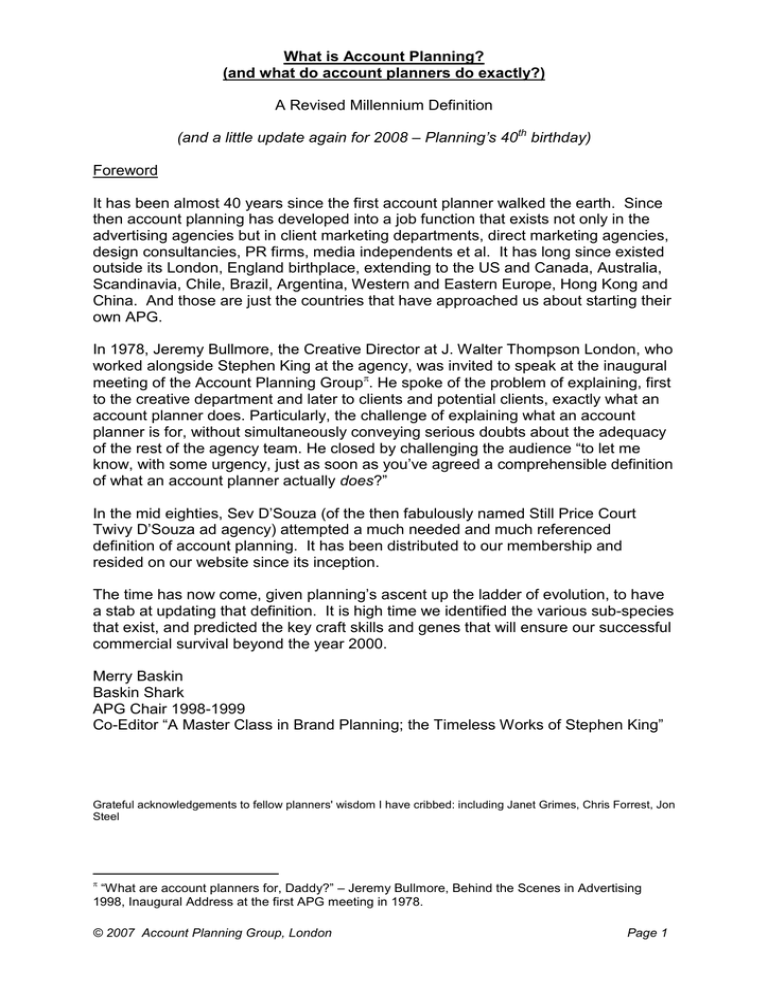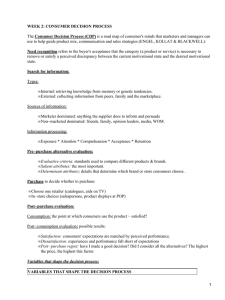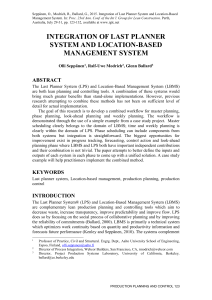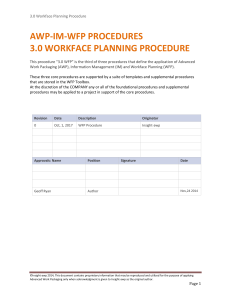What is Account Planning?
Anuncio

What is Account Planning? (and what do account planners do exactly?) A Revised Millennium Definition (and a little update again for 2008 – Planning’s 40th birthday) Foreword It has been almost 40 years since the first account planner walked the earth. Since then account planning has developed into a job function that exists not only in the advertising agencies but in client marketing departments, direct marketing agencies, design consultancies, PR firms, media independents et al. It has long since existed outside its London, England birthplace, extending to the US and Canada, Australia, Scandinavia, Chile, Brazil, Argentina, Western and Eastern Europe, Hong Kong and China. And those are just the countries that have approached us about starting their own APG. In 1978, Jeremy Bullmore, the Creative Director at J. Walter Thompson London, who worked alongside Stephen King at the agency, was invited to speak at the inaugural meeting of the Account Planning Group. He spoke of the problem of explaining, first to the creative department and later to clients and potential clients, exactly what an account planner does. Particularly, the challenge of explaining what an account planner is for, without simultaneously conveying serious doubts about the adequacy of the rest of the agency team. He closed by challenging the audience “to let me know, with some urgency, just as soon as you’ve agreed a comprehensible definition of what an account planner actually does?” In the mid eighties, Sev D’Souza (of the then fabulously named Still Price Court Twivy D’Souza ad agency) attempted a much needed and much referenced definition of account planning. It has been distributed to our membership and resided on our website since its inception. The time has now come, given planning’s ascent up the ladder of evolution, to have a stab at updating that definition. It is high time we identified the various sub-species that exist, and predicted the key craft skills and genes that will ensure our successful commercial survival beyond the year 2000. Merry Baskin Baskin Shark APG Chair 1998-1999 Co-Editor “A Master Class in Brand Planning; the Timeless Works of Stephen King” Grateful acknowledgements to fellow planners' wisdom I have cribbed: including Janet Grimes, Chris Forrest, Jon Steel “What are account planners for, Daddy?” – Jeremy Bullmore, Behind the Scenes in Advertising 1998, Inaugural Address at the first APG meeting in 1978. © 2007 Account Planning Group, London Page 1 Contents A Brief History: Where it started and why: the origins of the title the evolution of marketing What is Planning for?: why you should have some What Roles does Planning fulfil?: market researcher data analyst qualitative focus group moderator information centre bad cop (to account management’s/client service’s good cop) npd consultant brainstorming facilitator target audience representative/voice of the consumer soothsayer/futurologist media/communications planner strategic thinker/strategy developer writer of the creative brief think piece polemicist social anthropologist insight miner knowledge applicator What Planners don’t do The Ideal Account Planner: recruitment spec A Brief History of Account Planning Where it Started and Why Stephen King of JWT and Stanley Pollitt of BMP are the undisputed forefathers of account planning. In separate agencies, but at pretty much the same time, they started a revolution in the advertising world which has spread from the UK to other countries and from ad agencies to management consultancies, direct marketing, PR, design and client research departments. In 1964, Stephen King, dissatisfied with the workings of both the media and marketing departments within his agency, developed a new system of working (the T-Plan or Target Plan) which concentrated on combining consumer research and insights to create more effective, creative advertising. Stanley Pollitt in 1968, was concerned at the enormity of discretion given to account management in the writing of the creative brief, and felt that they were using data either incompetently or expediently. He wanted a research person at the elbow of © 2007 Account Planning Group, London Page 2 the account man. For Stanley, the voice of the consumer was of paramount importance, and using consumer research to clarify the issues and enrich the advertising development process was an essential component. When BMP was formed, each of its three accounts was managed by an account director and a (line function) account planner. Both Stanley and Stephen shared a desire to reorganise the media planning, market research and marketing departments. Stephen initially by a process, and Stanley via a person. Both were led towards the creation of a new department and a new discipline. “I hope that the coming anniversary of account planning isn't going to mean another orgy of "who first started it?" articles. There wasn't an It, it's impossible to tell and it's about the least interesting element of the whole thing.” email from Stephen King to Jeremy Bullmore in 1998 The Origins of the Job Title The name ‘account planning’ was coined by Tony Stead at a JWT awayday in 1968, attended by media planners and account people from the marketing department. “Tony Stead thought of the name ‘Account Planner’. We started by not knowing what on earth to call it. We thought of ‘Brand Planner’ and we used that as a code name for quite a while. Then people said that ‘brand’ suggests that we were only involved in small packaged things so Tony said “Why don’t you call them Account Planners?” And that was that. That was at a meeting of one of our Away Days in July ’68. There was a lot of discussion going on and by the time it had emerged we had a department of 23 people. It was very easy to cast because it was taking people from the Marketing Department and a very few key people from the Media Department. Some of the Reps felt a bit threatened by the new Department, but Reps always feel threatened, it’s part of their job description. We had a pretty bad first six months with Planners – who are inclined to gloom at the best of times – feeling that it was all a disaster. But it picked up………Planning seems to have lasted rather well”. Stephen King interview, Fifty in 40, the unofficial history of JWT London, Tom Rayfield Dec 1996 Delivered with characteristic understatement, planning has indeed lasted rather well, in spite of its unhelpful name. So this explains how we have been saddled with one of the most obfuscatory job titles ever since. Our North American friends in adopting the discipline have strived to better it with the likes of ‘Brand Planner’ and ‘Strategic Planner’ (preceded by the usual Senior Executive Vice President tosh, of course) but none of these appear to have stuck. Perhaps we rather enjoy the mystique of having a job title that implies crystal ball gazing without a clearly defined handle? The Evolution of Marketing A brief note on the nature of marketing in those days: From the 50s, ‘Marketing’ and ‘Marketing Plans’ were in fact executed by the agency (who also did everything else). Ad agencies pioneered market research; they created test kitchens for npd, devised TV programming (think Compton’s P & G soap operas ), PR ladies who lunched in hats etc etc. © 2007 Account Planning Group, London Page 3 The 60s and 70s brought dramatic changes as more and more clients restructured along marketing lines, such that nowadays the majority of clients have their own marketing and market research departments in house. These days they look to their agencies for specialist advice on advertising or whichever specific communications channels they specialise in rather than as (media neutral) marketing consultants. More fool them, some planners might say. For that broader brush communications vision to express a core brand idea is where planning has been heading for some time, and the accountability that planning can bring to the party has now slipped further down the agenda as marketing has ceased to feature at the board room level. Which is unfortunate. And also a topic for another day. What is Account Planning for (Daddy)? And why you should have some. Most problems benefit from being tackled systematically. Almost every communications agency (and their clients) benefits from a disciplined system for devising communications/advertising/commercial strategy. “Any systematic approach to planning advertising has to do more than simply provide controls and disciplines. It must actively stimulate imagination and creativity too” (Stephen King, JWT Planning Guide, 1974) We need a process that enhances an agency’s ability to produce outstanding creative solutions for our brands that will be effective in the marketplace. It is the planner’s job to guide or facilitate this process via the astute application of knowledge, otherwise known as consumer and market understanding. From the real world, outside the myopic, navel gazing self absorbed, self rewarding industry we love and work in. Only Planners (not Heineken) can do zees. And why can only planners do this? Planners are in a unique position because they (should) have a detailed understanding of the audience and the market context through research expertise AND an appreciation of how this can be applied to their client’s business. Planners must provide the crucial bridge between the two worlds in order to get customers to engage profitably with the brand. If researchers are data gatherers, then planners are knowledge applicators. Planners must insightfully interpret and illuminate the data, and develop intuitive hypotheses from it - not simply regurgitate it in an indigestible form for the rest of the brand group. So, at the core of the Planner’s task, is the need to understand the consumer, (and how they perceive the brand and the market), in order to unearth a key insight for the communication solution (Relevance). As non traditional media has mushroomed and new media communication channels have multiplied, it has become increasingly important for communication to cut through the clutter and the cynicism and connect with its audience (Distinctiveness). And Planners also need to prove its worthiness, to demonstrate how and why the communication has performed (Effectiveness). © 2007 Account Planning Group, London Page 4 With the burgeoning of digital communication the planners job has become much more like that of a social anthropologist. Whereas a key insight, proposition or message has been the development plank of most communications, how we “engage” with people through digital means is far more about observing and predicting behaviour and much more like product design – instead of trying to influence behaviour through changing how people think we are increasingly bypassing this process and moving straight to interaction and behaviour. This requires yet another set of skills – we are now facilitating product design, engineering engagement into the brand idea itself, not just its communications. Finally, the planner is there to bring upstream thinking to the brand’s ongoing development. For brands must move forward, or they die! What Roles does Planning Fulfil? Thinking about the portfolio nature of the planner’s working day, we’ve made a list of the various job functions and skill sets a planner often needs to fulfil. - Market Researcher Many account planners have evolved from market researcher origins. Jane Newman (undisputed Queen of Planning, USA) used to say that account planning ‘subsumed’ the agency market research function. We believe quite strongly that market research craft skills (and adherence to MRS (Market Research Society) Code of Practice principles) are the backbone of the planner’s platform. If you can’t devise, conduct, analyse, report on and monitor surveys objectively, how can you possibly hope to judge their usefulness or commission them appropriately? The planner should never assume that the researcher is the sole expert. Elements of questionnaire design, the way a question is phrased, for example, can fundamentally affect the outcome of the study. Black box modelling techniques may be so much impressive theory but they can critically enhance or destroy projects. Planners need to be able to ignore, challenge or exploit such things from a perspective built on understanding or on at least something more solid than assertion and prejudice. - Data Analyst The planner is charged with ensuring that all data relevant to the brand’s communication decisions be properly analysed, complemented with new research where appropriate, and then brought to bear on judgements of the creative strategy and evaluation of the communications. This is more than just knowing your way around computer tabs from a pre test, but also sales data, share data, trend data, demographics, etc etc. Knowing how to interrogate data and find a story through it rather than be intimidated by it is the challenge. Common sense, intuition, numeracy and clarity of thinking all help. Think of yourself as an ‘incisive detective solving the crime’ rather than a plodding copper on the beat ‘conducting house to house enquiries, asking people where they were on the night of 12th’. - Qualitative Focus Group Moderator Qualitative research (and the ubiquitous focus group) has taken on an increasingly significant role in everyone’s lives. “Let’s do a couple of groups and see what they © 2007 Account Planning Group, London Page 5 say and then we’ll adjust our policies to suit” says Tony Blair, former Brand Manager to the nation. Moderating your own groups is by far the best way of coming to grips with your target audience, putting yourself in their shoes and seeing the world from their perspective. It also gives the planner a confidence and an authority he/she wouldn’t otherwise be entitled to. It means you are both a psychologist and an interpreter. - Information Centre Knowledge is the bedrock of the planner’s craft. Knowing where to go to find stuff out is key. However much time pressure is brought to bear on your working day, planners should always make time to feed their heads. This generation of planners just don’t know how lucky they are to have the World Wide Web. I remember in my day we had microfiche in the local library ……. (mutter mutter) - Bad Cop (to account management’s good cop) Despite the fact that planners are outnumbered by account management by 4 to 1 (source: IPA survey 2000) we tend to work in pairs. Very often, it makes sense to adopt the bad cop/good cop routine with some clients and some creatives in order to deliver some bad/challenging/alternative/unexpected news without ruining the relationship. Since the news is usually grounded in objective fact, the planner should deliver it as constructively and simply as possible. Occasionally, of course, you get to play good cop, too – depending on your agency culture and your client relationships! - NPD Consultant One of the most fun aspects of working on multinational packaged goods brands is the fact that they are still investing in new product development. Being in at the birth of a product through to its positioning, naming, testing and (rarer than hen’s teeth) successful advertising launch, can be one of the most interesting and formative experiences for a planner. Don’t forget that it was Stephen King who invented pretty much every aspect of Mr Kipling, right from when RHM came to the agency and said our flour mills are producing a surplus, what shall we do with it? - Brainstorming Facilitator What better way than the brainstorm to hot house creativity or to get everyone on the team singing from the same song sheet so the brand and its communications can move forward? More challenging and more exhausting than the average group discussion because you’ll (hopefully) be dealing with the Chairman and the brand manager and the creative director in the same session, it’s also more rewarding. Make sure you have some good warm-up exercises up your sleeve. - Target Audience Representative/Voice of the Consumer It’s the oldie but goldie. The planner’s ‘cocktail party’ job definition. Their job is to ensure that an understanding of consumer attitudes and behaviour is brought to bear at every stage of communications development via continuous involvement in the process. Many of the places we work and the colleagues we work with are not representative of the sorts of people and places where our communications are © 2007 Account Planning Group, London Page 6 aimed, so it’s a good idea to be an empathetic sort, and to be curious about everything and everyone. - Soothsayer/Futurologist Let’s face it, our job title does have a hint of crystal ball gazing within it. This aspect of the planner’s craft is to have a genuine interest in and capacity to generate knowledge about trends and anticipate social movements that their colleagues can actually use to grow their brands. And then of course, there’s always the Henley Centre and Faith Popcorn. Planners can drive the future by finding gaps and creating interest in things the punter may not have thought of, but may be interested in. Faster horse, anyone? - Media/Communications Planner Some might say that this job is the next evolutionary phase of the account planner. Certainly, as new media emerge and the myriad of digital and interactive opportunities broaden, integration across media becomes every agency’s growth strategy and understanding how consumers consume communication their mission statement. It is therefore increasingly more important for the planner to understand the strategic role and effectiveness of different media, by target and by category, and know when and how it is relevant to use them to achieve the brand’s objectives. Studies have shown that people are now moving seamlessly between on and off-line using combinations of resources to make their decisions – understanding how they work together and how to assess their effectiveness is becoming more and more difficult. And more important for the planner to try and resolve it. - Strategic Thinker/Strategy Developer If the creative brief is one of the planner’s tangible product outputs, developing the brand communications strategy is the precursor task. Strategies help us get to the ‘right’ marketing/communications brief. It ensures the whole team are aware of the assumptions being made and aids evaluation of the work's effectiveness. The planner identifies the key issue and determines the role for communication against a specific target. It is the ‘How could we get there?’ proposition question on the Planning Cycle, once you have already figured out ‘why are we advertising?’ and the ‘what are we trying to achieve?’ bits. There is as much need for creativity in strategy as there is in media and execution, and a really creative strategy can make a substantial, definitive impact on the commercial outcome of a campaign. AA’s (Automobile Association) ‘4th Emergency Service’ and BT’s (British Telecom) ‘its good to talk’ are great examples of powerful strategies. - Writer of the Creative Brief The brief is widely considered to be the planner’s main product – or ‘key tangible deliverable’ to the creative development process. One of the myths is that all planners do is transcribe the client’s marketing jargon into baby talk so the creatives can understand it. There’s considerably more to it than that of course; clarity, brevity, and fertility being the hygiene factors of a good creative brief. And as the creative brief has the power to spark ideas – and ideas is what our business is all about – then that is a pretty important role. © 2007 Account Planning Group, London Page 7 Nowadays we also have to consider many new internal audiences – not just “creatives” but technologists, programmers, project managers, event organisers, editors. This means the briefs have to be multi-functional and, more importantly, agreed by many more people. The planner’s job here is not just to produce the brief but facilitate the process. - Think Piece Polemicist There are aspects of the planner’s job that sometimes entail sitting in a darkened room with a towel round your head, mulling over deep thoughts. These times may be accompanied by a passion or a fascination for a certain theme. Write it down, rant about it from conference platforms and blogs, get it published. Original thinking is a powerful tool, and when persuasively and compellingly delivered can have real impact on the business you are working on and the people you are working with. - Social Anthropologist Our world is changing at an amazing rate, with technology and information moving at a breathtaking pace. Advertising has always been a young person’s profession and nowadays it is even more important for creative people to be in touch and au fait with rapidly evolving cultural and social trends to ensure their idea’s relevance to the target audience. In the time its taken me to write this, surf wear has probably gone out of fashion, and my Sony VAI0 has been superseded by yet another “wafer-thin” mobile phone that thinks it’s a laptop. Monitoring cultural and social trends is a specialist task, and the findings need to be fed in early to brand and creative development. Differentiating between mere “fashion” and genuine cultural trends is not something for the inexperienced – many people can tell you what’s in and what’s out, but planners should be able to tell you why. - Insight Miner This section probably deserves its own book, but deriving insight from knowledge is one of the most important skills a planner can possess. These insights about the client’s business can come from a variety of areas: the consumer the client’s culture the marketplace/category the competition the brand (past, present, future) values the product qualities the advertising and communication conventions of the category Mining all these areas, (whether sporting a virtual helmet with a lamp on the front or not) peering into nooks and crannies without losing sight of the big picture in order to identify a key insight that can transform a client's business, is a real skill. “At the heart of an effective creative philosophy is the belief that nothing is so powerful as an insight into human nature, what compulsions drive a man, what instincts dominate his action, even though his language so often can camouflage what really motivates him” Bill Bernbach © 2007 Account Planning Group, London Page 8 - Knowledge Applicator Not wishing to sound like a cosmetic brush (or worse), there are those who believe most passionately that in this new information age it is in the applying of (rather than acquiring and regurgitating) knowledge that the planner truly comes into their own. To paraphrase Jon Steel, finding things out, filtering them, rethinking them laterally and then using that knowledge to help creative people come up with a (better) idea easier or faster means that the planner is doing their job properly and making a difference. Not making a difference in this way is a hindrance and you should move out of the way and let everyone else get on with it. What Planners don’t do (well) Opportunity here for some cheap gags about bag carrying (account man’s job) and the general administrative disfunctionality of the account planning breed. In general, planners are not very well organised. Tidy minds tend to move in a linear fashion, rather than laterally. And while some may feign incompetence so they don’t get stuck delivering proofs to clients at 11pm, it’s not advisable to ask a planner to do the following: - go to client meetings on their own (they’ll get lost) write the contact report (their minds wander) act as a shrill for the creative work (unless its grounded in consumer knowledge otherwise integrity and objectivity are compromised) write timetables (many of them do not possess a watch but use their mobile phone as a timepiece which they have left in the back of a cab) set deadlines (there might just be some other nugget out there that I’ve still to unearth) Have anything to do with invoices! © 2007 Account Planning Group, London Page 9 The Ideal Account Planner – Recruitment Spec The following is an excerpt from a recruitment brief from my days at Chiat/Day in the US. Were I to be setting up a department from scratch, I don’t think I would change much of it, except perhaps to substitute the word “communication” where it says advertising. With thanks to Rob White and Jane Newman. Key Characteristics Curiosity about what makes people act and think the way they do; capable or real insights into motivation; someone who understands that what people say is not necessarily what they believe or do; someone who is detailed enough to examine a problem from different perspectives without losing sight of the big picture; logical and analytical, yet capable of lateral thought; views research as a means to an end; not technique-oriented; pragmatic approach to problem solving. Ability to conceptualise and think strategically; ability to clearly identify problems (getting to the nub of it); capable of taking a commercial and making a reasonable judgement/guess on its intended effects (role of advertising, target consumer, desired responses); intuitive about people, brands and advertising; able to portray a target consumer without immediately stating demographics; an understanding of advertising as only one tool in the marketing mix, its potential uses and its limitations; an ability to see alternate strategic routes for a given problem/brand. Numerate. Able to visualise the meaning of numbers and generate hypotheses, or draw conclusions; an eclectic user of information, with a desire to draw on all sources rather than just the most recent; someone who accepts nothing at face value, and challenges assumptions until the whole picture (sales, quantitative, qualitative, competitive info, etc) makes sense. Advertising orientation; passionate about the subject, “I’ve always been interested in advertising”; above all, someone who enjoys talking about advertising. Presentation skills; able to argue a point of view coherently and concisely; not afraid of big or senior audiences; able to ‘win’ an argument without making the protagonist (client) feel like a loser; quick-thinker; able to speak authoritatively, without seeming dogmatic or inflexible. People skills; a team player; someone who can appreciate and use inputs from others; someone who knows when to push and when to relax. Great personality! Must be able to see the funny side of it all; to be a participant, not an observer; involvement must be genuine, not forced; must to able to deal with pressure, unpredictable circumstances (like jumping on a plane to Wichita at a moment’s notice), an informal, loosely structured work environment, and (occasional) criticism; not territorial nor defensive nor paranoid. © 2007 Account Planning Group, London Page 10 The Ideal Craft Skills and Experience of an Account Planner Finally, there is an aphorism, to which I subscribe, that there is no such thing as a “junior planner”. Joseph Heller would approve. The problem is that the planning role (in most agency cultures) is imbued with such credibility and authority that whatever a planner says can be construed as pearls. And as with most professions, the more experience you have (in terms of not just breadth of categories worked in, years on the clock but also craft skills accumulated), the more useful and productive you can be. The following therefore is a list of ideal experience and craft skills for a full grown adult planner. Market Research Practitioner – Bedrock - - Conversant with the key methodologies and practitioners Understands how to use the research tool; its potential and its limitations. Qualitative skills – able to translate research objectives into a discussion guide, experienced moderator, comfortable dealing with parties both sides of the one way mirror. Good facilitator (brainstorms, awaydays etc) Quantitative skills – Well versed in basic quantitative terms, philosophy, methodologies and protocols, has experience of tracking studies, A&Us, test markets, and quantitative advertising research. Able to write questionnaires and read data tables. Knows how to tell good studies from bad (can kick the tyres on a survey). Brands - Has been involved with decisions about brands, as opposed to decisions about research. Has understanding of brands and their brand values. Advertising and Communications - Has direct experience in the development and production of commercial communications, preferably not just 30 second ads. People Management - - - To have had client contact experience at Marketing Director level (minimum). Able to present points of view or research findings to this level of audience. Team catalyst – not just a good team player but able to “lead” teams via persuasion, facilitation, inspiration rather than command and control leadership. Comfortable working with a broad church of types – junior to senior, creatives to media, design to digital, senior clients to secretaries, teenagers to businessmen. Able to train, motivate appraise and “bring on” juniors, not simply delegate their menial jobs to them. © 2007 Account Planning Group, London Page 11



